Paula Vince's Blog: The Vince Review, page 46
August 22, 2017
'The Sacrament of Happy' by Lisa Harper
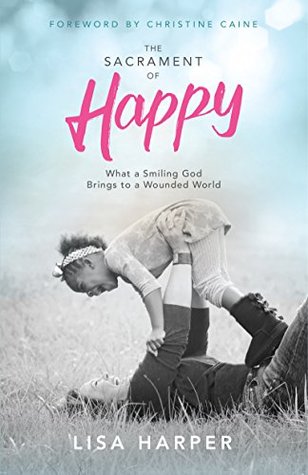
Imagine hearing your physician tell you that chips and queso contain more nutritional benefits than kale and quinoa. Or opening an envelope that looks like just another bill, and unfolding instead an official document declaring you the sole beneficiary of an anonymous billionaire’s estate.
In her new book, The Sacrament of Happy: Surprised by the Secret of Genuine Joy, Lisa Harper unveils a similarly extravagant, unexpected surprise, declaring that happiness—just plain feeling happy—is a gift from God that you can unashamedly enjoy.
MY THOUGHTS:
I enjoy reading and reviewing the occasional book about happiness theories, as there's always a lot to get out of them. This one's sound premise attracted me. In years gone by, happiness got a bad wrap from dour Christians who thought it was based on shallow, swinging emotions, but in reality, God actually wants us to be happy. It may even be one of his major purposes for us. Lisa Harper reminds us that there are thousands of direct or closely related references to happiness in the Bible, which suggests that it might be our calling.
However, her style of writing frequently caused me to lose her thread. She begins sections with interesting questions, such as, 'How do we cultivate happy?' or 'How can we recover our happy?' or 'Can happy change the world?' Then she launches into long, humorous personal anecdotes that tend to ramble off on tangents. Reading the book became an exercise of seeing how she could wind her stories back to the points she was trying to make. In fact sometimes they went on for so long that I had to keep flipping back to remind myself what the initial question even was.
Harper doesn't always make allowances for different temperaments either. 'How does happiness express itself?' is a good example. Her self-proclaimed temperament is different from mine. Harper is energetic, loud and sanguine, and some of her advice seems crafted for people who are similarly wired. Those of us who enjoy more low-key styles of happiness can find good points in the book too, though. And some advice is great across the board, such as regularly frisking our thoughts, making sure we keep moving, and exercising intentional gratitude.
I could imagine this author being a stand-up comedian and getting crowds laughing, which I'm sure she does. Overall, it's not a bad book, although you may find some parts more relevant than others for you.
Thanks to B&H Publishing Group and NetGalley for my review copy.
3 stars
Published on August 22, 2017 15:26
August 20, 2017
'The Picture of Dorian Gray' by Oscar Wilde
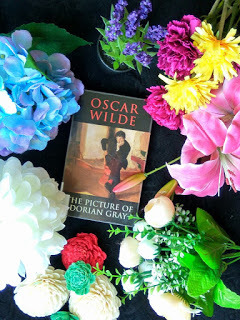
Written in his distinctively dazzling manner, Oscar Wilde’s story of a fashionable young man who sells his soul for eternal youth and beauty is the author’s most popular work. The tale of Dorian Gray’s moral disintegration caused a scandal when it first appeared in 1890, but though Wilde was attacked for the novel’s corrupting influence, he responded that there is, in fact, “a terrible moral in Dorian Gray.” Just a few years later, the book and the aesthetic/moral dilemma it presented became issues in the trials occasioned by Wilde’s homosexual liaisons, which resulted in his imprisonment. Of Dorian Gray’s relationship to autobiography, Wilde noted in a letter, “Basil Hallward is what I think I am: Lord Henry what the world thinks me: Dorian what I would like to be—in other ages, perhaps.”
MY THOUGHTS:
Wow, there are lots of flowers in this story. Lovely scents and perfumes are everywhere. Our hero always seems to be either sniffing or arranging them. Maybe it's all part of his fixation on the transience of beauty, which is partly what this story is all about.
Gorgeous young Dorian Gray has just had his portrait painted by artist Basil Hallward. The charismatic Lord Henry Wotton advises Dorian to enjoy his good looks while he still has them, since they'll start to fade some day. Henry believes physical beauty is the only thing worth having. In a rash moment, Dorian vows that he'd give his own soul if only he could swap places with the portrait and remain stunning, while his image grows old and decrepit instead. To his shock, that's exactly what begins to happen. While Dorian retains his sultry, innocent appearance, the picture bears not only the passing years but the impact of his hard living, bad choices and sinful nature too.
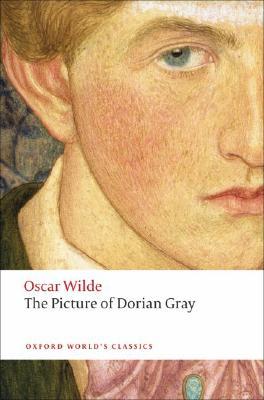
It's sort of a chilling parable, urging readers to give at least a passing thought to the state of our own souls. Dorian understandably hides his painting away from prying eyes, down in the old schoolroom behind a heavy curtain. He's knows it's a visible gauge of what's going on with the state of his inner man. Even though ours aren't as in-your-face as Dorian's, Oscar Wilde's novel challenges us to question whether or not we're concealing nasty secrets of our own. What if our inner lives were made plain to all on some other plane? Could we stand seeing them without flinching? It's not entirely comfortable stuff.
The book is also about true happiness and satisfaction. Henry and Dorian, who become best buddies, live decadent and hedonistic lifestyles, denying themselves nothing. Their basic motto would have to be, 'If it feels good, do it.' FOMO (fear of missing out) seems to drive them. If anything may be rumoured to offer a whiff of pleasure, these guys are out chasing it! While still underage, Dorian wants his guardians to understand that 'unnecessary things are his only necessity.' Yet I wonder if their eventual jadedness and disillusionment have echoes of Oscar Wilde's own. It's pretty clear from the tone of the story that he must have been on the same wavelength as them. He was a celebrity of his time, not only for his writing but for being at the forefront of the Victorian 'dandy' movement in London. Was it all it was cracked up to be?
He mentions 'tedium vitae' which is Latin for the weariness of life that comes on those to whom life denies nothing. Few of us get the chance to live as if time or money are no object, so it's probably a revealing experience to wallow from time to time in the lives of those who can. (And 'wallowing' is an apt word for getting into Henry's and Dorian's head spaces. You don't want to spend too long there, believe me. Their luxury and leisure are appealing up to a point, but we soon want out.)
The nature of a bad influence got me pondering. Plenty of innocent folk are corrupted during the course of this novel. From the start, Henry quickly steers Dorian to an unsavoury, self-indulgent lifestyle. In turn, the beautiful and fascinating Dorian Gray gains a reputation for ruining the lives of anyone who gets close to him. Of course, both Henry and Dorian deny that they have such power. They believe there must be some latent evil in the souls of the others in the first place, to be led astray. 'Like responds to like,' is how they explain the phenomenon. It does beg the question of whether some people are more corruption proof than others. In a way, blaming Henry and Dorian may be a cop-out for not taking responsibility for their own poor decisions. But on the other hand, there definitely was a pattern. It seems hanging out with those two was really putting the strength of a person's moral integrity to the test. Maybe the book says something about the fragility of human nature. Wilde was asking, 'Are you sure your high principles are rock solid?'
Henry and Dorian enjoy an enduring friendship, yet I wouldn't want them on my list of best literary bromances. There's something a bit creepy and corrupt about it. In the first place, Henry wanted to get his unscrupulous clutches into Dorian, to discover to what extent he could influence him. Even well into their relationship when he admires him intensely, there's something self-congratulatory about his feelings. Henry has created a monster, albeit a very nice looking one.
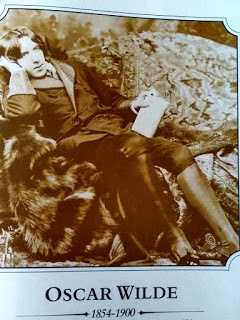
I couldn't forget the author as I was reading his book. Reading Dorian Gray makes me feel very sorry for what Oscar Wilde was forced to endure in his prison years. To go from sliding out of satin sheets after midday to two years of intense physical labour would have to be rough. No wonder it contributed to his early death.
I always like to finish off with some quotes, and as Oscar Wilde was a renowned wit, there are plenty to choose from. But you've got to take them tongue-in-cheek in a story like this. We get plenty of dodgy, questionable advice from Lord Henry Wotton, but most times it's nothing readers should really take on board. Dorian did to his peril.
Henry: There's only one thing worse than being talked about, and that's not being talked about. (From what we know of Oscar Wilde, this was one of his own personal mottoes too.)
Henry: To get back my youth I'd do anything in the world, except take exercise, get up early and be respectable.
Henry: One should never make one's debut with a scandal. Save it to be interesting in your old age.
Henry: Murder is always a mistake. One should never do anything that one cannot talk about after dinner. (Maybe some of his advice is pretty sound, on rare occasions.)
Overall, if you think it doesn't matter what's bubbling away under the surface, as long as you look good, think again. The proverb not to judge a book by its cover is really brought home in this particular book. It's also an interesting glimpse of the decadent movement in what they used to call the 'naughty nineties.'
The Picture of Dorian Gray is also on my lists of Stories that Feature Beautiful Portraits and Greatest Narcissists if you'd like to check them out.
4 stars
Published on August 20, 2017 12:00
August 16, 2017
A wise but illiterate woman
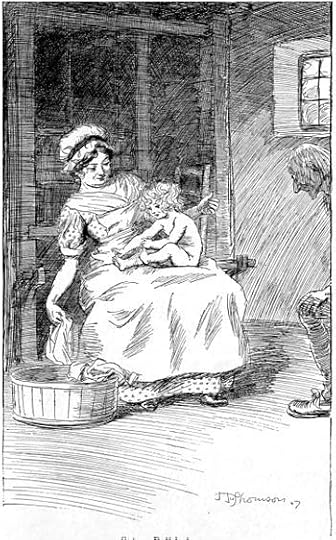
Her name is Dolly Winthrop and she's from Silas Marner by George Eliot. She's a simple, hardworking village mother. One of the salt-of-the-earth type who manged a large household and family when times were not easy. Dolly was always ready to lend a helping hand, and took it upon herself to befriend the lonely weaver Silas Marner and the little girl he'd just adopted.
I was wondering why Dolly appeals to me so much. I think it's partly because she's everything I used to train myself not to be. Her homespun wisdom comes straight from her own head and heart, because she's never even learned to read. We get no re-hashed book wisdom from Dolly. She doesn't even know any big words, let alone try to impress people by using them. We can be certain that she gives only what she's pondered through her own personal observations of life, human nature and changing seasons. Such a refreshing lady is hard to find for real, especially in the 21st century.
As I said, I was way different to her. Studying English at Uni in my youth scared me away from the classics for several years. A lot of the academic waffle and jargon soared over my head. It gave me a sinking feeling that the enlightened beings behind the podium must be higher mortals than the rest of us. I think I developed some sort of imposter's syndrome for even being there. So I started trying to impress each of the professors and tutors by writing the sort of essays I imagined they'd most like to read. I listened carefully to opinions they expressed in lectures and started doubting my own impressions as too simplistic, if not totally off the page. Without consciously realising I was doing any such thing, I started trying to figure out smart people's opinions to take them on board as my own. One day I realised, 'I don't know whether I'm thinking as myself, my tutors, or my text book. Will the real me please stand up?'
I knew it was time to stop regarding others as models of how to think. It took ages to train myself back to thinking for myself, which I assume is what we're born doing. I can't even say for sure that I totally succeeded, but I've been trying. An education is a great thing, but that might be one of its down sides. We aren't doing ourselves any favours by blindly trusting and admiring the self-proclaimed learned beings. That's why I loved Dolly Winthrop's way of going off to think for herself, and then putting her impressions into her own words.
There's her simple reason for going to church.
'I feel so set up and comfortable as niver was, when I've been and heard the prayers and singing to the praise and glory o' God, and if a bit o' trouble comes, I feel I can put up wi' it for I've looked to help i' the right quarter and gev myself up to Them as we must all give ourselves up to at the last; and if we'n done our part, it isn't to be believed as Them as are above us 'ull be worse nor we are, and come short o' Theirn.'
Then there's her feelings about the seasons and cycles.
'It's like the night and the morning, and the sleeping and the waking, and the rain and the harvest. One goes and the other comes, and we know not how nor where. We may strive and scrat and fend but it's little we can do arter all, the big things come and go with no striving of our'n.
Challenged by Silas, she has a serious ponder about why things happen the way they do.
'It come to me clear as daylight, but whether I've got hold on it now, or can anyways bring it to my tongue's end, that I don't know. It come into my head that Them above has got a deal tenderer heart nor what I've got, for I can't be anyways better nor Them as made me, and if anything looks hard to me, it's because there's things I don't know on; for it's little as I know. That's all as ever I can be sure on, and everything else is a big puzzle to me when I think of it. Eh, there's trouble i' this world, and there's things as we can niver make out the right on. And all as we've got to do is to trusten, Master Marner, to do the right thing as far as we know, and to trusten. For if us as knows so little can see a bit o' good and rights, we may be sure as there's a good and a rights bigger nor what we can know. I feel it i' my own inside as it must be so. And if you could but ha' gone on trustening, you wouldn't ha' run away from your fellow craturs and been so lone.'
Finally, here's her attitude about things we may never understand, no matter how hard we may try to figure them out.
It's the will o' Them above as a many things should be dark to us; but there's some thing as I've never felt i' the dark about, and they're mostly what comes i' the day's work. You were hard done by that once, Master Marner, and it seems as you'll never know the right of it; but that doesn't hinder there being a rights, Master Marner, for all it's dark to you and me.
So Dolly is one of the literary women I greatly admire. Anybody who desires to think through the big questions, then comes up with solutions which put their hearts to rest deserves all the serenity they get. She even has a word of her own about trying to take the opinion of learned folk on board. 'It'd mayhap take the parson to tell us some things, and he could only tell us in big words.' So rather than trying to fathom them, she makes her own sensible conclusions. Good on her.
Published on August 16, 2017 12:00
August 13, 2017
'Evelina' by Frances Burney
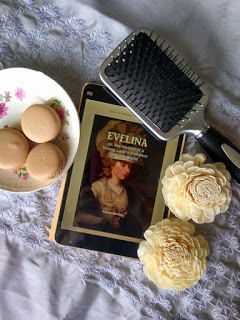
Frances Burney's first and most enduringly popular novel is a vivid, satirical, and seductive account of the pleasures and dangers of fashionable life in late eighteenth-century London.
As she describes her heroine's entry into society, womanhood and, inevitably, love, Burney exposes the vulnerability of female innocence in an image-conscious and often cruel world where social snobbery and sexual aggression are played out in the public arenas of pleasure-gardens, theatre visits, and balls. But Evelina's innocence also makes her a shrewd commentator on the excesses and absurdities of manners and social ambitions--as well as attracting the attention of the eminently eligible Lord Orville.
Evelina, comic and shrewd, is at once a guide to fashionable London, a satirical attack on the new consumerism, an investigation of women's position in the late eighteenth century, and a love story.
MY THOUGHTS:
I chose this novel as my Pre-1800 choice in the 2017 Back to the Classics challenge, since it was published way back in 1778. Frances Burney wrote Evelina anonymously at a time when novel writing (and reading) was frowned upon. I was thinking, 'I'll bet this was the sort of novel young girls were warned not to read.' I can guess how parents of that time might have found it time wasting. Burney's language has old fashioned charm, but her subject matter is pretty lightweight. Even when I'd got a few hundred pages into it, the storyline seemed to be nothing but socialising and trying to dodge the attention of annoying dudes. Several times I almost didn't finish. Not only was nothing much happening, but none of the characters grabbed my sympathy or liking. In fact, several of them were incredibly obnoxious.
Here's a quick summary. Evelina has been brought up by the elderly Reverend Arthur Villars, because her mother died giving birth and her father disowned her. She should have been an heiress of two fortunes, but instead, she's an unknown country rustic. However, family connections want Evelina to make her entrance into the world. Her French grandmother plans to win her fortune on her father's side by proving that the bounder was indeed married to her daughter. Evelina, who's been sheltered and innocent, has no idea about the predators and potential corrupting influences she'll find in the big city. The story is told in letters, mostly from her to her beloved guardian.
We're told part of her problem was 'too much beauty to escape notice, but too little wealth to be sought.' I've got to say, most of the men are depicted as complete shallow twits. They all fall head over heels in love with Evelina at first sight because she's pretty, without knowing or caring what sort of person she is. There are bullies, misogynists, philanderers, creeps and crashing bores. Fanny Burney sure knew how to create unflattering male characters, but I'm not sure that's a good recommendation for her book. These days, Evelina could get a restraining order against a pain in the neck like Sir Clement Willoughby.
One shining exception is Lord Orville, who Evelina thought could do no wrong. She had a huge crush on him from the very start, and called him, 'one who seems formed as a pattern for his fellow creatures.' Whoa, that's strong praise. Would you give your husband or boyfriend such a sweeping compliment? In Orville's case, perhaps it was true though, when you consider his competition.
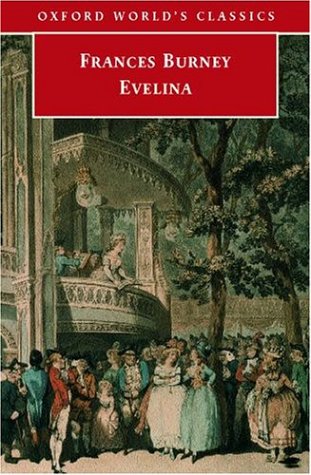
The eighteenth century would have been a tough time to be alive, because everything had to be a certain way. It was a real cookie cutter generation. You probably wouldn't hear any advice to 'be true to yourself.' They'd be more likely to say, 'Do what she's doing.' You were obliged to be feminine or masculine, according to your gender, and the rules were unbending. Both Evelina and Villars find Mrs Selwyn's tendency to use sarcasm and satire too forward and manly, whereas nowadays, we'd be more likely to accept that this is just her nature.
It seems you didn't have to step too far out of line to be considered low-bred or vulgar. Both Evelina and Orville were disgusted when three young men had a conversation about eating, including their extensive knowledge of sauces and dressings. To them, they came across as gluttons and epicures. To me, they might have been discussing a reality cooking show on TV, and I might've even joined in.
And then there's Evelina's newfound cousins, the Branghton siblings, who she cringed to be seen with. She was anxious to get rid of Sir Clement, yet still ashamed to have him see her with them. Okay, here's my confession. They didn't seem bad enough to warrant that sort of snobbery. If you've ever read this book, haven't you come across far worse people than the Branghtons? But Evelina knew the Regency social cues and I don't. If I managed to catch a time machine to that era, I'd probably be an outcast in a flash.
If you make it to the end, the story turns into a sudden soap opera with all sorts of stunning family revelations I thought were hilarious. For any other book I'd say, 'Come on, no way!' For this one though, my reaction was, 'Something's happening at last.' I'm not overly impressed with Fanny Burney's work based on Evelina, which is said to be her best. She might've been revived for a few reasons. The age of the book alone gives it a sort of hallowed charm, and she's also someone Jane Austen used to read. It's probably a sort of second hand fame, but I'd rather stick to Jane from now on. One thing I took from this book is that long, rambling small talk you can't escape from was just as tedious in the eighteenth century as it is in the twenty-first.
But to finish off with, here are some quotes. As there were so many pests, I'll grab a couple from them just to show what Evelina had to put up with.
Sir Clement Willoughby: I'm no advocate for hats. Where there is beauty, they only serve to shade it, and where there is none, they excite a most unavailing curiosity.
If you think that's bad, how about this one, from his friend?
Lord Merton: I don't know what the devil a woman lives for, after thirty. She is only in other folks' way.
Okay, let's mix it up with a few nicer ones.
Evelina: My intentions are never willfully blameable, yet I err perpetually. (There's one thing I have in common with her.)
Villars: A youthful mind is seldom totally free from ambition; to curb that is the first step to contentment, since to diminish expectation is to increase enjoyment. (That's probably the best line in the whole book, and it was over within the first few pages.)
I felt inclined to give it three stars just because it's the oldest book by a female author I've ever read, but no, I've got to stick true to my ranking criteria, and I really felt like giving up many, many times.
2 stars
Published on August 13, 2017 12:00
August 9, 2017
Stories about Insomnia
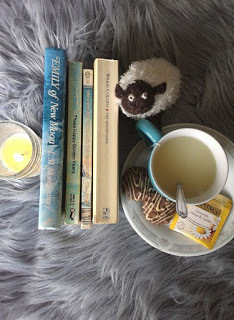
I'm sure we've all battled this beast at some time or another, and tried counting thousands of sheep. Thankfully I've never been a chronic sufferer, but it's caused terrible frustration on random nights, when I've joined the ranks of keyed up mortals googling books with titles such as Desperately Seeking Snoozin'. I'm sure all these purchases must be made at 2 or 3 am.
Sleep experts suggest not lying there stewing, but getting up to work or read a book. So I've compiled this list for times when you might need it. And take my word for it, there's nothing much around like what I'm about to offer. If you google 'insomnia stories' you'll be more likely to find a litany of true woe-is-me anecdotes from poor suckers, rather than fun lists of literary gems. Call this the Insomnia Hall of Fame if you like, proving that we're in good company.
I'll start with the desperate and sinister side of insomnia (just to prove that things might be worse).
 1) Shakespeare's Henry IV Part 2
1) Shakespeare's Henry IV Part 2I think this might have been guilt-induced sleeplessness. Henry had Richard II deposed so he could claim the throne, but now the poor wretch trudges the palace passages all night long, groaning because his poorest subjects are that moment enjoying the luxury that's denied to him. 'O sleep, o gentle sleep, nature's soft nurse, how have I frightened thee?'
 2) The Yellow Wallpaper
2) The Yellow WallpaperCharlotte Perkins Gilman came out the other side of what she considered a bout of near madness, and wrote this story to help process her experience. The main character, who probably suffered a bout of post natal depression, is ordered to relax and recuperate, but the yellow wallpaper in her bedroom starts sending her around the twist. She lies awake all night to the point where she believes other women may be confined behind it. From there, it's an easy leap to assume that she might even be one of them! No wonder she can't sleep.
 3) Stephen King's 'Insomnia'
3) Stephen King's 'Insomnia'Ralph Roberts not only has to put up with the frustration, but also experiences disturbing visions with his. He can detect auras around people, and also sees a strange race he dubs the 'little bald doctors', who are engaged in a terrible battle against the Crimson King.
 4) Laura Ingalls Wilder
4) Laura Ingalls WilderIn 'These Happy Golden Years' she describes a tough time she had while she was teaching far from home, and boarding with the Brewster family. Mrs B used to lose her cool and brandish the carving knife, making desperate threats of murder or suicide. She was a very unhappy lady. So was Laura, when she found herself lying awake, staring into the darkness, ever alert in case she was the unlucky victim.
 5) Emily of New Moon
5) Emily of New MoonThe poor little heroine is staying with her Great Aunt Nancy. She's convinced that the chimney behind the head of her bed is haunted, because it's full of sinister sounds. Each night she lies awake, frozen with terror, until somebody tells her that the commotion isn't coming from ghosts, but from a flock of nesting birds. Whew! I think I'd still prefer silence, but it did the trick for Emily.
 6) The Moonstone
6) The MoonstoneThis is my favourite of the lot. Poor Franklin Blake was addicted to tobacco but gallantly tries to quit cold turkey, because Rachel, the woman he loves, hates the smell in his clothes. As a withdrawal symptom, he suffers successive nights of terrible insomnia until Mr Candy, the doctor, decides to end his misery by sneaking a drop of opium into his nightcap. That sets off a catastrophe for poor Franklin that takes him months to get to the bottom of. I've reviewed it here.
And the next lot of stories are about times when insomnia proves to be productive.
 7) Tom's Midnight Garden
7) Tom's Midnight GardenPoor Tom finds it hard to sleep while staying with his aunt and uncle, so he slips out of bed to wander around undetected once they're asleep. If it hadn't been for his nocturnal exploring, he would never have made his astounding discovery. My review is here.

8) The Lion, the Witch and the Wardrobe
Lucy and Susan can't get to sleep one night. They can sense that something ominous is in the air. When they creep out of their tent for a moonlight walk, they stumble upon their beloved Aslan at a crucial moment in his life. The girls are able to offer the great lion some much needed comfort and support before he bravely sets off to the Stone Table, to meet the White Witch and her minions.
The final three are straight from the Bible, so if you'd like to think of it this way, perhaps your insomnia could be part of a divine plan :)
9) Jacob
He was too uptight about meeting his brother, Esau, to fall asleep. The meeting was set for the following day, and Jacob had no idea what sort of reception to expect. So he took a stroll away from the campsite, and ended up spending the rest of the night wrestling with a powerful warrior. When it dawned on Jacob that the man was the Angel of the Lord, he summoned his nerve to ask for a blessing. What a missed opportunity it might have been had he fallen asleep.
10) Gideon
It was the night before a huge battle against the Midianites. The leader of the Hebrew army understandably couldn't sleep. He wiled away the hours by creeping off to the enemy's camp, where he overhears two soldiers discussing their terror of the Jews. One of them (who obviously didn't share Gideon's insomnia) describes a prophetic dream that they will certainly lose to Israel. Gideon takes it as an excellent sign and returns to his own camp with his courage restored.
11) King Artaxerxes
This mighty Persian ruler has an inexplicable bout of insomnia one night, and decides to try lulling himself to sleep by reading some dry historical records. Sounds like the right idea. His reading reminds him that a Hebrew named Mordecai had done him a great service long ago, and had never been rewarded. Behind the scenes, the king's wicked advisor, Haman, is plotting Mordecai's downfall. This was nipped in the bud, so the king's insomnia helped Mordecai's life.
Maybe this list is a good start to give us a sense of comradeship during those moments when sleep eludes us. Getting stuck into these books may also help give us the zzzzs, which is what we really want. Please let me know if you can think of any others.
Published on August 09, 2017 12:00
August 6, 2017
'Silas Marner' by George Eliot
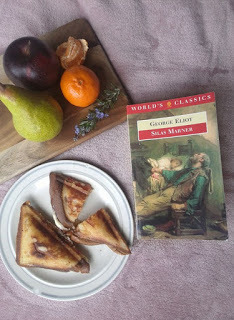
Embittered by a false accusation, disappointed in friendship and love, the weaver Silas Marner retreats into a long twilight life alone with his loom. . . and his gold. Silas hoards a treasure that kills his spirit until fate steals it from him and replaces it with a golden-haired founding child. Where she came from, who her parents were, and who really stole the gold are the secrets that permeate this moving tale of guilt and innocence. A moral allegory of the redemptive power of love, it is also a finely drawn picture of early nineteenth-century England in the days when spinning wheels hummed busily in the farmhouses, and of a simple way of life that was soon to disappear.
MY THOUGHTS:
What a beautiful pastoral tale, with characters who take whimsical old folklore to heart as if it's factual, and live their lives by it. The setting seems straight out of Mother Goose nursery rhymes. It's a feel-good story, but also written to get us wondering whether the the traditional things to which we ascribe meaning and happiness are really legitimate.
It's the sort of book where you can't help summing up the whole plot if someone asks, 'What's it about?' However, even though spoilers aren't really an issue, I'll make sure to reveal as few as possible.
As a young man, Silas Marner was betrayed in a nasty manner. Set up by a former best friend, for a crime he didn't commit, he scoots off to the faraway village of Raveloe, where he licks his wounds for fifteen years. He's deeply hurt not only by his friend's deception but by what he perceives as God's decision not to clear his name. It was an instant mindset change from devout believer to disillusioned atheist, and Silas got himself a reputation for being eccentric, aloof, and a tad creepy.
His sole pleasure is hoarding away the money he earns from his cloth weaving business, but one day it's stolen. Grievously let down for a second time, Silas is devastated until it seems the divine powers see fit to restore it, no longer as cold, hard cash, but in the shape of a golden haired little girl. Of course Silas knows there must be some more logical explanation for her arrival by his hearth, but nothing comes to light for several years, during which he becomes her beloved dad.
Little Eppie (short for Hephzibah) is a delight. As Silas brings her up, we see him begin to look at life through her loving and curious eyes - and Eppie takes joy in common pleasures such as birds and flowers. If we really enter into the spirit of the story, it's inevitable that we catch it too. Maybe one of the best things to do for an unhappy person is to encourage them to look at the world through your more optimistic eyes, and kids do this unconsciously. George Eliot pulled it off brilliantly with her invention of Eppie and Silas, for nobody needed little girl therapy more than he did. It could be one of the pioneer daddy/daughter stories.
The story of Eppie's biological father is quite fascinating. Godfrey Cass, the squire's son, is a wishy-washy young man who doesn't stand up and take responsibility for her, for reasons you'll see. Since Eliot presents all Godfrey's faults, I was wondering why we can't help liking him a tiny bit just the same. After all, we despise other guys like him in literature. I'm sure it's because he compares favourably to his brother Dunstan. It's typical of Godfrey to worm out of facing up to things, and he gets us readers doing it for him too. We decide he may be pathetic, but at least he's not a rotten egg all through. Sometimes it seems reasonable to call a guy a hero just because he's not as bad as his brother.
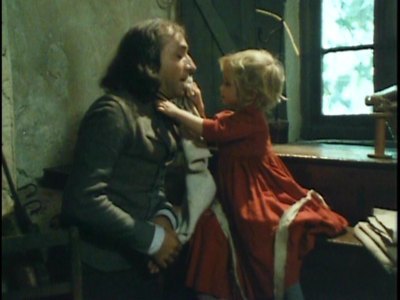
The story is really interesting from a historical perspective, happening as it does near the end of the Napoleonic war and on the very cusp of the industrial revolution, when cottage industries like Silas' began to struggle.
There's the food. Some of us wouldn't have the stomach to live in nineteenth century, rural England. Even supposedly delicious Christmas cooking included such fare as lardy cakes, black pudding and pigs' trotters. I could be wheedled into sampling the first, but the other two are out of the question. These folk loved their food though. We're told, 'The rich ate and drank freely, and accepted gout and apoplexy as things that ran mysteriously in respectable families.'
Another thing that made me grin about these Raveloe villagers is their attitude to church attendance. Even though they're devout Anglicans, they have the best excuse not to turn up every Sunday in the calendar. It's an omission of generosity. They don't want to show such a greedy desire to get a good standing with heaven that they get an undue advantage over their neighbours. I've got to remember that one next time I feel like staying in bed on a Sunday :)
And there's the wealth thing. Eliot presents several people with excellent social standing and lots of money who aren't happy. And there are people with no social standing and no money who are happy, and it's because the quality which truly brings happiness has nothing to do with money. Even when Silas used to get his thrills from hoarding his crock of gold, he seemed to know instinctively that nothing he could spend it on would buy satisfaction. (Although I do wish he'd gone to a good optometrist in London to get a pair of spectacles. But he just put up with his signature near-sightedness all through the book, possibly regarding it as his lot from above. Come on Silas, admit that money is handy for some things.)
Whatever criticism scholars might level at George Eliot over the years, this book convinces me that I might've got along really well with her. Her character development is the reasonable type, where people don't have turnarounds that encompass an entire personality change. Godfrey is a spoiled git at the start, and he's slightly less of a git by the finish. Here's what we're told about his dissatisfaction. 'I suppose it's the way of all men and women who reach middle age without a clear perception that life never can be thoroughly joyous.' I reckon Eliot just used Godfrey to sum up the crux of a midlife crisis, although they wouldn't have recognised it as such back then.
By the end, Eppie knows her priorities without giving the matter a thought, which is the opposite to her birth father. It's almost enough to make us wish we could pack up, go back in time and live next door to Eppie and Silas. Then we remember the lack of basic mod cons such as electricity and hot running water, and decide maybe not. But the nearest thing is to put this book up among my bad mood busters, and highly recommend it for George Eliot's wise insights into human nature as well as the sweet story.
Now for some good quotes from various characters, major and minor.
Jem Rodney (when he's briefly accused of stealing Silas' gold): What could I ha' done with his money? I could as easy steal the parson's surplice and wear it. (Good point about thefts in small settlements. This guy is the village mole catcher. How's that for a nice old English job description?)
Squire Cass (to his son, Godfrey): You hardly know your own mind enough to make both your legs walk one way. (That was spot on, and spoken without knowing a fraction of Godfrey's messy dilemma.)
Ben Winthrop: When I've got a pot o' good ale I like to swaller it and do my insides good, instead o' smelling and staring at it to see if I can find fault wi' the brewing. (A sound attitude about being critical. This guy's wife also has plenty of simple wisdom, but I'll give her a post of her own)
Miss Priscilla Lammeter: You'll never be low when you've got a dairy. (An interesting cure for depression.)
Silas Marner: When a man turns a blessing from his door, it falls to them as takes it in. (Bravo! What a suitable last word.)
5 stars
Published on August 06, 2017 12:00
August 2, 2017
Be open to change
For the last couple of years, I've been having trouble settling down to write a new novel. Since the nineties, I used to rip right into them very quickly, but that feeling of eureka in the planning stage has been eluding me. I would find that even when I devised plans which might have some merit, I couldn't force my enthusiasm to jump on board to the extent it used to. Since that sense of fizzing anticipation was once my green light, I didn't want to move without it. I knew there wouldn't be much point anyway. That strong drive to woo others to share my love of my plots and characters had been my motivator.
For some time, it distressed me if I thought about it too hard. I thought I had a case of writer's block, and faced all the frustration and loss of identity that went with it. Acquaintances would ask, 'What book are you working on now?' and I'd mumble something about sifting through ideas. On one hand, I really wanted my mojo back, but on the other, it was nice to have a break from all the emotional energy it took, which I'd been drawing from for several years, and one project after the next. Because my characters often had some pretty tough issues going on.
Anyway, this photo of my local wetlands in the summer heat seemed an accurate picture of what I thought my creative mind resembled then. A desolate looking dust bowl. But I didn't want to admit to to anyone.

Then one day it struck me that I was still writing the same volume anyway. The writing pads and pens I was flying through were still the same as before, and so were the number of hours I'd sit at my computer typing. I assumed I'd developed writer's block, but I was simply writing different things. One was a factional account of my grandfather's life, based on the prolific notes my Dad had asked me to type for him. I also wrote lots and lots of blog posts, including numerous lists and reflections about reading and writing. The source of my writing hadn't dried up at all. It had simply changed direction, at least for a period of time. I guess it can happen.
In fact, when it comes to ideas for blog posts, my mind is like this. The exact same spot, but during last year's floods. And that water got even deeper, so you couldn't see the bridge at all, because it was completely submerged.
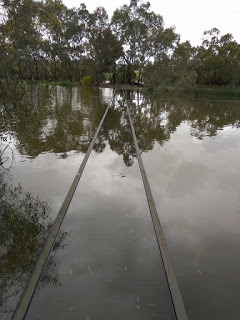
Contemporary Christian dramas is what I wrote, and at the moment, I'm considering the possibility that there may be no more from me. They might be a season of my life that really has dried up. Perhaps some things are for a particular time, and then a drive to move on to something else catches up with us. Maybe our spiritual antennae should be always primed to pick up new possibilities in the air. It makes a lot of sense that since we're all different, something which might be a lifelong mission for one person could be stepping stones for another. And of course, the outcomes that eventuate may be way different from the outcomes we plan anyway. (Of course I won't say that I'll never, ever write another one, because by the same token, I might be wrong. Some day a new idea might come.)
Author and doctor Rachel Naomi Remen wrote a personal testimony in her book, Kitchen Table Wisdom. It's a long time since I read it, but it went something like this. She'd planted a wonderful rose garden, intending to enjoy the blooms from a particular room of her house. One morning, she glanced out the window to see a magnificent buck (male deer) standing in her rose garden, munching her new rose buds with great relish. He was so stately and majestic, with his spotted hide and elegant, spreading antlers that she couldn't help catching her breath. And something whispered in her heart, 'You thought you were planting this rose garden so you could enjoy the splashes of colour. But it turns out the real reason you planted it was so you could attract and enjoy visits from this awesome fellow and his friends and family.' And so it turned out to be.

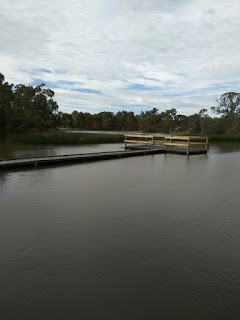 In a similar way, I'm liking what I'm writing at the moment. I thought I started my book review blog just so I could request access to brand new releases from Net Galley. But maybe a more far-reaching reason turns out to be so I can ponder all sorts of ideas I'm getting from books, new and old, and making connections between different stories which help me see the world in ways that wouldn't have occurred to me otherwise.
In a similar way, I'm liking what I'm writing at the moment. I thought I started my book review blog just so I could request access to brand new releases from Net Galley. But maybe a more far-reaching reason turns out to be so I can ponder all sorts of ideas I'm getting from books, new and old, and making connections between different stories which help me see the world in ways that wouldn't have occurred to me otherwise.
And I thought I was just doing my Dad a quick favour when I agreed to type out his notes, but it turned out to be a consuming idea which gripped me for longer than I ever expected. For anyone who enjoys contrasting shots as much as I do, and what the great outdoors can show us, those are a couple more glimpses of my daily walk in different seasons.
For some time, it distressed me if I thought about it too hard. I thought I had a case of writer's block, and faced all the frustration and loss of identity that went with it. Acquaintances would ask, 'What book are you working on now?' and I'd mumble something about sifting through ideas. On one hand, I really wanted my mojo back, but on the other, it was nice to have a break from all the emotional energy it took, which I'd been drawing from for several years, and one project after the next. Because my characters often had some pretty tough issues going on.
Anyway, this photo of my local wetlands in the summer heat seemed an accurate picture of what I thought my creative mind resembled then. A desolate looking dust bowl. But I didn't want to admit to to anyone.

Then one day it struck me that I was still writing the same volume anyway. The writing pads and pens I was flying through were still the same as before, and so were the number of hours I'd sit at my computer typing. I assumed I'd developed writer's block, but I was simply writing different things. One was a factional account of my grandfather's life, based on the prolific notes my Dad had asked me to type for him. I also wrote lots and lots of blog posts, including numerous lists and reflections about reading and writing. The source of my writing hadn't dried up at all. It had simply changed direction, at least for a period of time. I guess it can happen.
In fact, when it comes to ideas for blog posts, my mind is like this. The exact same spot, but during last year's floods. And that water got even deeper, so you couldn't see the bridge at all, because it was completely submerged.

Contemporary Christian dramas is what I wrote, and at the moment, I'm considering the possibility that there may be no more from me. They might be a season of my life that really has dried up. Perhaps some things are for a particular time, and then a drive to move on to something else catches up with us. Maybe our spiritual antennae should be always primed to pick up new possibilities in the air. It makes a lot of sense that since we're all different, something which might be a lifelong mission for one person could be stepping stones for another. And of course, the outcomes that eventuate may be way different from the outcomes we plan anyway. (Of course I won't say that I'll never, ever write another one, because by the same token, I might be wrong. Some day a new idea might come.)
Author and doctor Rachel Naomi Remen wrote a personal testimony in her book, Kitchen Table Wisdom. It's a long time since I read it, but it went something like this. She'd planted a wonderful rose garden, intending to enjoy the blooms from a particular room of her house. One morning, she glanced out the window to see a magnificent buck (male deer) standing in her rose garden, munching her new rose buds with great relish. He was so stately and majestic, with his spotted hide and elegant, spreading antlers that she couldn't help catching her breath. And something whispered in her heart, 'You thought you were planting this rose garden so you could enjoy the splashes of colour. But it turns out the real reason you planted it was so you could attract and enjoy visits from this awesome fellow and his friends and family.' And so it turned out to be.

 In a similar way, I'm liking what I'm writing at the moment. I thought I started my book review blog just so I could request access to brand new releases from Net Galley. But maybe a more far-reaching reason turns out to be so I can ponder all sorts of ideas I'm getting from books, new and old, and making connections between different stories which help me see the world in ways that wouldn't have occurred to me otherwise.
In a similar way, I'm liking what I'm writing at the moment. I thought I started my book review blog just so I could request access to brand new releases from Net Galley. But maybe a more far-reaching reason turns out to be so I can ponder all sorts of ideas I'm getting from books, new and old, and making connections between different stories which help me see the world in ways that wouldn't have occurred to me otherwise.And I thought I was just doing my Dad a quick favour when I agreed to type out his notes, but it turned out to be a consuming idea which gripped me for longer than I ever expected. For anyone who enjoys contrasting shots as much as I do, and what the great outdoors can show us, those are a couple more glimpses of my daily walk in different seasons.
Published on August 02, 2017 16:00
July 30, 2017
'Status Anxiety' by Alain de Botton
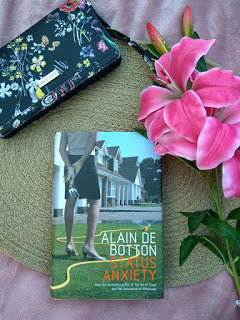
Anyone who’s ever lost sleep over an unreturned phone call or the neighbor’s Lexus had better read Alain de Botton’s irresistibly clear-headed new book, immediately. For in its pages, a master explicator of our civilization and its discontents turns his attention to the insatiable quest for status, a quest that has less to do with material comfort than with love. To demonstrate his thesis, de Botton ranges through Western history and thought from St. Augustine to Andrew Carnegie and Machiavelli to Anthony Robbins.
Whether it’s assessing the class-consciousness of Christianity or the convulsions of consumer capitalism, dueling or home-furnishing, Status Anxiety is infallibly entertaining. And when it examines the virtues of informed misanthropy, art appreciation, or walking a lobster on a leash, it is not only wise but helpful.
MY THOUGHTS:
This book takes a really interesting look at a common phenomenon which was never much of an issue until the early nineteenth century (although we do see examples as far back as the New Testament). You'd think that ushering in an era of equal opportunity for all, regardless of race, gender or background, would have to be a good thing, right? Well, it would seem every sparkling rainbow might have a cloudy lining, to twist a popular proverb around a bit. In this case, the beast that raised its ugly head is called meritocracy.
In a nutshell, when people used to be born into fixed social positions, their destinies were out of their control, so they just made the best of the hands fate dealt them. But now, most western individuals are born into a society in which there are far more life options than ever before, and theoretically, somebody born in a ghetto or slum has the potential to become rich and famous. Now that we are all held responsible for shaping our own individual stories, the silent implication is that if we fall short of our goals, or miss some social measuring stick, then we're losers and flops.
In the first half of this book, Alain de Botton takes a closer look at meritocracy and some of its nasty relatives, including snobbery and expectations. The second half studies ways in which people have tried to neutralise these over the years, so that status anxiety is no longer an issue. These include philosophy, art, politics, Christian tenets and Bohemian theories. I really like de Botton's eloquent way of writing, and the photos he's including to push home the points he makes.
His section on the arts includes the writing of great novels. So often, these aim to turn narrow social assumptions upside down and provide voices for marginalised people. They do it in a very persuasive, descriptive and fascinating way, which is partly why I've always loved reading them. Visual artists do similar things when they present humble scenes or modest people as some of the loveliest we can lay our eyes on.
 There's a really thought-provoking thread in the Christianity section about how quickly all things pass away, putting all the energy we may expend to look good and impress the right people in a sort of perspective. It gets us wondering whether we should redefine what we consider a worthwhile pursuit or a waste of time. The photos of nature, ruins and antiquities just pushes home the point. This book is a keeper, which I'll put on my shelf to dip into at other times.
There's a really thought-provoking thread in the Christianity section about how quickly all things pass away, putting all the energy we may expend to look good and impress the right people in a sort of perspective. It gets us wondering whether we should redefine what we consider a worthwhile pursuit or a waste of time. The photos of nature, ruins and antiquities just pushes home the point. This book is a keeper, which I'll put on my shelf to dip into at other times.Some great quotes that stand out.
'We may be happy with little when we've come to expect little. And we may be miserable with much when we've been taught to expect everything.' William James
'The price we have paid for expecting to be so much more than our ancestors is a perpetual anxiety that we are far from being all we ought to be.' Alain de Botton
'Other people's heads are a wretched place for true happiness to have its seat.' Arthur Schopenhauer
And finally there's this sentence, which might be worth a ponder. 'Cynics are only idealists with awkwardly high standards.'
4.5 stars
Published on July 30, 2017 15:08
July 26, 2017
Famous Story Book Tea Parties
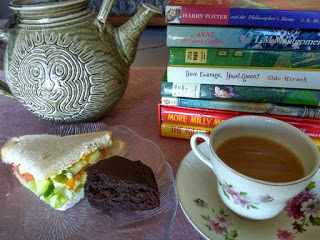
There's no get-together quite like an afternoon tea party. Not only are they delicious but also elegant. You get to wear your loveliest clothes and eat beautiful looking finger food, which also tastes good, since plenty of it is loaded with sugar. And if you're into socialising, it's the perfect venue for showing off your refined manners without being out of place. What's not to love?
I suppose morning tea could be included here too, but it doesn't have quite the same charm as afternoon tea. Morning tea is more likely to be some generic biscuit from a packet dunked into a cup of instant tea or coffee in a foam cup, before knuckling back down to work. It doesn't have the decadence of afternoon tea, after which we can go home at our leisure and have a good excuse not to cook an evening meal, because we're still full of afternoon tea.
So without further ado, here are some of my favourite afternoon tea parties from the pages of stories.
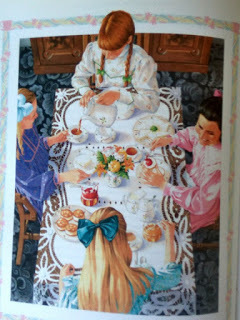
1) Alice in Wonderland
 She doesn't realise what a mad tea party it will turn out to be until she gets there. It appears civilised enough, set up outdoors at the March Hare's house, with the Mad Hatter and a sleepy Dormouse in attendance. Alice is affronted by being told there's no room for her, since there's obviously plenty of space. She's offered a glass of wine, but there isn't any in sight. Then the March Hare dips his watch in a cup of tea. The conversation quickly gets ridiculous. Alice decides to leave soon after realising that she's crashed a perpetual tea party, because the others think it's permanently 6 o'clock. More on Alice here.
She doesn't realise what a mad tea party it will turn out to be until she gets there. It appears civilised enough, set up outdoors at the March Hare's house, with the Mad Hatter and a sleepy Dormouse in attendance. Alice is affronted by being told there's no room for her, since there's obviously plenty of space. She's offered a glass of wine, but there isn't any in sight. Then the March Hare dips his watch in a cup of tea. The conversation quickly gets ridiculous. Alice decides to leave soon after realising that she's crashed a perpetual tea party, because the others think it's permanently 6 o'clock. More on Alice here.
2) Anne of Green Gables
In a generous mood, Marilla offers to let Anne host a tea party for Diana. Anne plans to serve cherry preserves, fruit cake, cookies, snaps, and raspberry cordial. But alas, that's not the only red hued beverage Marilla stores in the pantry. The drink which Diana declares the best cordial she's ever tasted turns out to be currant wine, and her three large glassfuls have catastrophic results. Poor Marilla hasn't made any wine for years, since finding out the minister doesn't approve. 'I just kept that bottle for sickness,' she says, but the damage is done. More on Anne here.
 3) Jane Eyre
3) Jane EyreA positive event brightens poor little Jane's early days at the harsh old Lowood School. Nice Miss Temple invites Jane and Helen into her private office, which has a cosy fire. She treats them to a surprise tea table with china cups and a bright teapot. Mrs Harden, the dour housekeeper, refuses to supply more bread and butter, but it's okay, because Miss Temple has a delicious seed cake hidden in her chest of drawers. It's like nectar and ambrosia to the girls. My review is here.
 4) Enid Blyton's Faraway Tree
4) Enid Blyton's Faraway TreeThe children love climbing to Moonface's house at the very top of the Faraway Tree, where they share some most intriguing food. There are pop biscuits, which do just as they say; toffee shocks, that swell until your mouth can't contain them and then burst; hot cold goodies, with changing temperatures, and google buns, with massive amounts of sherbet packed inside currants. Enid Blyton's name isn't always the first we think of for fantasy stories, but she had some excellent, edge-of-the-seat tales. And she used the name 'google' for these buns long before it became popular for large numbers and search engines.
5) Harry Potter
 On their way to school on the Hogwarts Express, the students always take the opportunity to indulge in tea parties in their carriages, supplied from the amazing delicacies sold by the trolley witch. On his very first trip, Harry had intended to stock up on Mars Bars, but then he discovers Bertie Bott's Every Flavour Beans, Chocolate Frogs, Pumpkin Pasties, Cauldron Cakes, Licorice Wands and all the other tasty things. He buys up big with his newfound wealth, which is most significant in cementing the friendship with his new best friend Ron, who is quick to shove aside his boring old sandwiches from home.
On their way to school on the Hogwarts Express, the students always take the opportunity to indulge in tea parties in their carriages, supplied from the amazing delicacies sold by the trolley witch. On his very first trip, Harry had intended to stock up on Mars Bars, but then he discovers Bertie Bott's Every Flavour Beans, Chocolate Frogs, Pumpkin Pasties, Cauldron Cakes, Licorice Wands and all the other tasty things. He buys up big with his newfound wealth, which is most significant in cementing the friendship with his new best friend Ron, who is quick to shove aside his boring old sandwiches from home.
6) The Lion, the Witch and the Wardrobe
When Lucy first arrives in Narnia, she's invited to share afternoon tea with a quaint little faun named Mr Tumnus. For such a strange new world, he tempts her with very British sounding treats, including lightly boiled brown eggs, sardines on toast, toast with honey, and sugar topped cake. The afternoon tea turns out to be a bait, so he can summon the wicked queen of Narnia, who has always been on the lookout for boys and girls. But Mr Tumnus changes his mind in the nick of time, since he's taken a shine to Lucy.
7) Little Women
 Amy wants to treat the girls in her drawing class to a tea party. Apart from plain old cake, sandwiches, fruit and coffee, she insists on the addition of cold tongue and chicken, french chocolate and ice-cream, because that's what her guests are used to. But after all the expense and preparations, only one girl bothers to show up. I would have liked to be in her place, except for the cold tongue, which I don't fancy the sound of at all. Reviews are here and here.
Amy wants to treat the girls in her drawing class to a tea party. Apart from plain old cake, sandwiches, fruit and coffee, she insists on the addition of cold tongue and chicken, french chocolate and ice-cream, because that's what her guests are used to. But after all the expense and preparations, only one girl bothers to show up. I would have liked to be in her place, except for the cold tongue, which I don't fancy the sound of at all. Reviews are here and here. 
8) Around the World in 80 Days
Although it doesn't happen quite the same in the book, one scene sticks in my mind from the old movie with David Niven. Phileas Fogg and Passepartout are drifting in their hot air balloon through some European alps, enjoying a leisurely afternoon tea in the basket, including a good drop of wine. The acrobatic Passepartout manages to scoop some snow from a passing branch to ice their bottle. I've reviewed it here.
9) Hazel Green
 She's from one of my favourite kids' series. Hazel needs to ask an urgent favour of Yakov, the strange new boy who has moved into her apartment building. She doubts he'll be easy to convince, especially since she's always shunned him in the past. Luckily she has a friend named Mr Volio who is the best baker in town. Together they bring a mobile tea party to Yakov's house, including all sorts of delicious cakes and pastries. Reading these stories are enough to make my mouth water. I've reviewed them here. Not many people I've met have read Hazel Green, but the situations she finds herself in are fantastic for kids and adults alike!
She's from one of my favourite kids' series. Hazel needs to ask an urgent favour of Yakov, the strange new boy who has moved into her apartment building. She doubts he'll be easy to convince, especially since she's always shunned him in the past. Luckily she has a friend named Mr Volio who is the best baker in town. Together they bring a mobile tea party to Yakov's house, including all sorts of delicious cakes and pastries. Reading these stories are enough to make my mouth water. I've reviewed them here. Not many people I've met have read Hazel Green, but the situations she finds herself in are fantastic for kids and adults alike! 10) Milly-Molly-Mandy
10) Milly-Molly-MandyIt's the type of book series we love when we're tiny, then revisit when we have little girls of our own. Uncle gives Milly-Molly-Mandy a cute dolls' tea set, and she gets permission to invite her little friend Susan to share afternoon tea. But halfway to Susan's house, the girls meet up with the exact same story. Susan's father has given her a tea set too, and she wants to invite Milly-Molly-Mandy. It takes their friend Billy Blunt to solve the dilemma. He suggests that they combine the tea parties, as long as he can stay to share the 'special little cake, proper little loaf, tiny little tart', some bread and jam and lots of dripping.
Do you enjoy living it up at the occasional tea party yourself? Looking down my list, I think the most significant thing about them is friendship. All the politeness and refinement is really just an excuse to strengthen bonds and create memories. If you can think of any other good tea parties, or if any of the ones I've mentioned strike a chord with you, please share your thoughts in the comments. And if I could, I'd treat you all to afternoon tea at my place.
Published on July 26, 2017 12:00
July 23, 2017
'The Phantom of the Opera' by Gaston Leroux
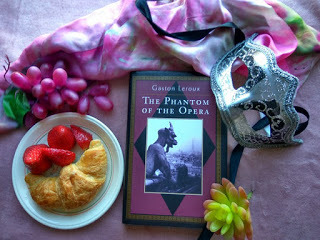
The Phantom of the Opera is a riveting story that revolves around the young, Swedish Christine Daaé. Her father, a famous musician, dies, and she is raised in the Paris Opera House with his dying promise of a protective angel of music to guide her. After a time at the opera house, she begins hearing a voice, who eventually teaches her how to sing beautifully. All goes well until Christine's childhood friend Raoul comes to visit his parents, who are patrons of the opera, and he sees Christine when she begins successfully singing on the stage.
MY THOUGHTS:
This is my choice for a classic in translation, in the 2017 Back to the Classics Challenge.. It's a famous French story set mostly within the walls of the Paris Opera House. I'd never come across the original version, or Gaston Leroux, until I picked this up at a second hand shop. To be honest, if anyone had asked me who wrote Phantom of the Opera, I would have guessed Andrew Lloyd Webber. So it was very interesting to read about the charismatic French author in the foreword. Did I like his story though? Hmmm, well, it started off promising but went downhill quickly.
Basically, it was written as a supernatural thriller. A ghost is rumoured to haunt the Opera House. The chief scene shifter, who claims to have seen him, is found hanging dead from the rafters. And rumours that the ghost looks hideous are circulating. The theatre's ex-managers have resigned because they're spooked, but their replacements aren't warned what to expect until the night of the swap-over. They treat the haunting like a big joke, at least to begin with.
It turns out to be a bossy, tyrannical type of ghost who wants to run the whole show. When people ignore his demands, he makes sure something terrible happens. He wants a specific theatre box permanently reserved just for himself, and a regular sum of cash left for him in an envelope. Why would a ghost need money? You may well ask. All of his aggressive notes are signed O.G. for Opera Ghost.
His biggest agenda seems to be to advance the career of a young singer named Christine Daae, who believes he's the Angel of Music. While still alive, her deceased father promised to send him to her, a bit like a muse. At first, Christine laps up the ghost's personal attention and dreads the thought of ever losing it, but she comes to learn the spine-chilling cost of being his favourite. Especially since he's the jealous type and she's fallen in love with an old friend from her childhood; a young man named Raoul.
The sinister theme is the best thing the story has going for it. An innocent person is seduced by somebody who initially comes across like an angel, but when they find out he's the opposite, it seems too late to escape the fix they're in. How easily a well-meaning person like Christine can open themselves up to disaster and calamity, when they welcome with open arms something bad, because they believe it's good. Although I appreciated this, I was still getting tired of the novel toward the end.
First, it would have been nice if the story's hero had been a worthy contrast to the phantom, but Raoul is a spoiled brat. He's gullible and believes everything he's told. He overreacts with hissy fits whenever Christine is about to tell him something important, pays her out with cranky remarks, and rushes in whenever he loses his temper, without a thought of treading carefully. He doesn't hesitate to use emotional blackmail by bursting into tears because he's not getting his own way. And he asks the same, self-focused questions as the phantom. Raoul's first thought is always something like, 'If he were handsome, would you still love me?'
Raoul and the phantom come across like temperamental twins to me, yet Raoul's lucky enough to be the better looking of the two. In fact, since the phantom has the whole tragic, 'I just want someone to love me for myself' thing going, a bit like Frankenstein's monster, some may even think that gives him a bit of an edge. (But come on dude, do you think being ugly is really a reasonable excuse for killing innocent people who have never hurt you?) Christine could have done very well without either of them. They're a pair of male drama queens and prima donnas, but since it's set in the opera house, I guess that makes sense.
Although this has nothing to do with the actual story, the blurb on my dust jacket was a great disappointment, because it gave a major plot spoiler, revealing the ghost's identity! Whoever wrote it must have assumed we're all familiar with the story by now, but I'd never seen it on stage, and if I'd seen the movie, my memory was sketchy. I can overlook honest spoiler mistakes from reviewers like myself, but coming from a professional blurb writer, it's a bit hard to swallow.
I would've preferred to see the stage version than read this book. I'm even humming 'The Music of the Night' as I type. Some of the unfolding explanations for the plot events seem way over-the-top and melodramatic to take seriously in a novel, yet they'd work if we've paid money to be thrilled with stunning stage effects and brilliant music. I noticed Leroux wrote other books too, with titles such as 'The Perfume of the Lady in Black' and 'The Man who came back from the Dead.' Based on this one, I'm happy to give them a miss. I read somewhere that even Andrew Lloyd Webber thought this novel a promising story, with a terrible execution.
I often like to add a good quote or two from whichever book I'm reviewing. Okay, this one made me grin. 'They felt the sort of dismay which men would have felt if they had witnessed the catastrophe that broke the arms of the Venus de Milo.' An extravagant, arty quote from an extravagant, arty book. I think I'll send it back to the goodwill shop where it came from.
2.5 stars
Published on July 23, 2017 12:00
The Vince Review
Author, blogger, reader, reviewer, mother of three. All this goes under the mantle of 'stay at home mum'. I also love walking and cooking when the mood strikes me. Getting stuck into a good book has a
Author, blogger, reader, reviewer, mother of three. All this goes under the mantle of 'stay at home mum'. I also love walking and cooking when the mood strikes me. Getting stuck into a good book has always been one of the best things ever.
I invite you to treat this blog like a book-finder. People often ask the question, "What should I read next?" I've done it myself. I try to read widely, so hopefully you will find something that will strike a chord with you. The impressions that good books make deserve to be shared.
I read contemporary, historical and fantasy genres. You'll find plenty of Christian books, but also some good ones from the wider market. I also read a bit of non-fiction to fill that gap between fiction, when I don't want to get straight on with a new story as the characters of the last are still playing so vividly in my head. ...more
I invite you to treat this blog like a book-finder. People often ask the question, "What should I read next?" I've done it myself. I try to read widely, so hopefully you will find something that will strike a chord with you. The impressions that good books make deserve to be shared.
I read contemporary, historical and fantasy genres. You'll find plenty of Christian books, but also some good ones from the wider market. I also read a bit of non-fiction to fill that gap between fiction, when I don't want to get straight on with a new story as the characters of the last are still playing so vividly in my head. ...more
- Paula Vince's profile
- 108 followers



